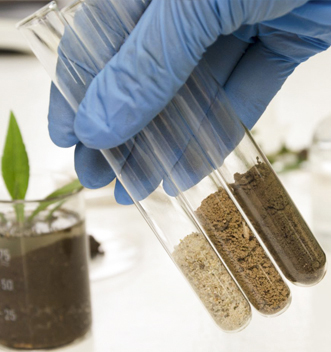

Soil is a fundamental and ultimate finite resource that fulfills a number of functions and services like Agriculture, Industrial Construction, Ecological Habitat Development, etc. Some of the most significant impacts on this resource occur as a result of activities associated with unlimited use of chemical fertilizers, non-scientific construction activity; unplanned city design, unscientific land use patterns and land filling by toxic materials.
The quality of the groundwater depends upon the health of the top or subsoil. It is important to map the contaminated area by analyzing the topsoil or subsoil and accordingly plan for the better management of this “Resource”.
A soil test can determine the fertility or the expected growth potential and it also indicates the nutrient deficiency and potential toxicity which helps in taking cost-effective decisions about the use of fertilizer, irrigation water, and the variety of seeds for better productivity.
EFRAC has a separate division to analyze all the physical and chemical properties of soil, besides providing the technical interpretations and recommendations for various projects. We at EFRAC, perform Quality tests, detect impurities of Soil with highly sophisticated equipment like UPLC and LC/MSMS and etc.
[Soil, the principal but a finite resource, is integral to the sustenance of life processes – supporting plant life, filtering and holding moisture and sequestrating Carbon, etc. is the base upon which Environment and human activities such as Agriculture, Habitat Development, Construction, etc. are built on.
Damaging human activities like unscientific land use patterns, indiscriminate & illogical use of chemical fertilizer, mining activity, along with unplanned Urban Habitation & extraction of groundwater plus haphazard disposal of waste through landfills, have damaged soil health through physical degradation & chemical contamination.
Groundwater quality depends upon the health of the top or subsoil. It is important to map the contaminated area by analyzing the topsoil or subsoil and accordingly plan for the better management of this “Resource”. A soil test can determine the fertility or the expected plant growth potential, nutrient deficiency, and potential toxicity which help decide on the composition of fertilizer, irrigation water, and the seed for better productivity.
EFRAC has a separate division to analyze all the physical and chemical properties of soil, besides providing the technical interpretations and recommendations for various projects. EFRAC, performs tests for Quality, for detection of impurity in Soil using highly sophisticated equipment like UPLC and LC/MSMS and etc.]


Soil Testing
Bulk Density • Specific Gravity • Porosity • Acidity • Salinity & Alkalinity • Water Holding Capacity • Field Capacity • Moisture • Texture pH Conductivity • Total Carbon Organic Matter • Primary Nutrients • Secondary Nutrients • Micro Nutrients • Minerals & Trace Elements [Available, Total] • Total & Available Nitrogen • Available & Total Chloride • Sulphate • Nitrate • Nitrite • Phosphate • Sulphur • Cation Exchange Capacity (CEC) Sodium Absorption Ratio
• pH & Conductivity Meter • Analytical Balance • Flame Photometer • AAS-GTA/VGA • CHNS & O analyser • GC-MS/MS • HR-GC • HR-MS • UV-Visible Spectrophotometer • ICP-MS • Auto Titrator & Coulometer